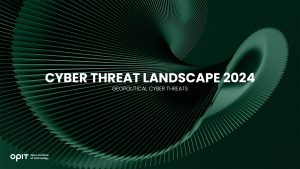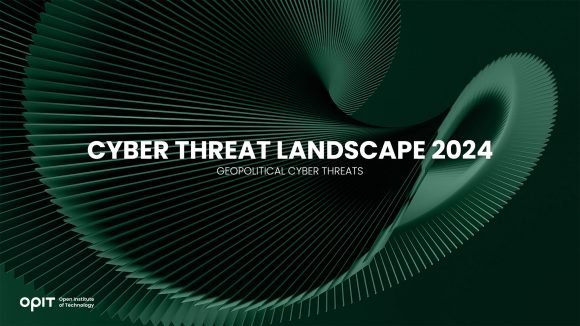Read the full article below (in Italian):


There are currently few things that worry CEOs worldwide as much as geopolitics. Cybersecurity is undoubtedly one of them. But what happens when you combine geopolitical conflicts and cyber threats?
Geopolitical cyber threats, that’s what.
This lethal combination threatens to disrupt economies, destabilize governments, and shatter global stability. That’s why it must be met with an ironclad cybersecurity strategy.
But what does that strategy entail?
That’s for Tom Vazdar and Venicia Solomons to answer. Tom is the chair of the Master’s Degree in Enterprise Cybersecurity program at the Open Institute of Technology (OPIT). Venicia is a seasoned cybersecurity architect and advocate who has rightfully earned the nickname “the Cyber Queen.”
Here’s what these two esteemed cyber professionals have to say about geopolitical cyber threats in their highly informative master class titled “Cyber Threat Landscape 2024: Navigating New Risks.”
What Are Geopolitical Cyber Threats?
Geopolitical threats refer to cyberattacks (or campaigns) driven by political motives. These attacks are often conducted by state-sponsored actors and have a specific strategic goal in mind.
For instance, Iran-backed hackers have recently been targeting U.S. water systems, aiming to disrupt Israeli-made equipment globally. This example also perfectly illustrates the targets of geopolitical cyberattacks – critical infrastructure, government systems, military networks, and other relevant entities.
But don’t jump to conclusions – the private sector isn’t immune to such attacks.
Cybercriminals have also targeted private companies to steal intellectual property, disrupt operations, or extort money. However, what differentiates these attacks from other cyberattacks is the motivation behind them.
Whether it’s through espionage, sabotage, or disinformation, geopolitical cyber threats always aim to achieve a political or strategic advantage for the attacker.
How Do State-Sponsored Cyber Threats Differ From Other Cyberattacks?
In their master class, Tom and Venicia specifically focus on state-sponsored cyber threats, even though they aren’t the only type of geopolitical cyber threats. Why? Because they’re the most advanced and sophisticated cyber threats.
As Venicia puts it, state-sponsored cyberattacks involve “specialist hacking techniques,” “stealthy behavior,” and “stealthy execution.” That’s why the consequences of these attacks are often only seen after significant damage has been done.
This leads us to another distinctive characteristic of state-sponsored cyberattacks – they typically involve long-term execution.
You see, other forms of cyberattacks usually want to reach their goal as soon as possible. For instance, a ransomware attack will infiltrate your system, and the hacker will ask for ransom straight away.
A state-sponsored cyberattack, on the other hand, usually plays the long game. That’s why they’re considered an advanced persistent threat (APT). Remaining undetected for a long time allows these threats to collect lots of critical data and perform long-term espionage.
Tom adds that the goal of these cyberattacks is another important distinction. As mentioned, they usually have a strategic goal in mind. “Regular” cyber threats, in contrast, typically only aim for financial profit.
Why Is Geopolitical Cybersecurity Important?
For the most part, traditional warfare was limited to three battlefields – the land, the air, and the sea. However, as Tom points out, two vital battlefields have joined the fray – space and cyberspace.
Sure, threats in cyberspace aren’t overtly visible like those on land, air, or sea. However, they can be just as devastating, if not more so – especially if they’re geopolitical cyber threats.
Here’s how Tom and Venicia break down the importance of geopolitical cybersecurity.
Protecting Against Espionage
As mentioned, espionage is one of the leading types of geopolitical cyberattacks. Since espionage aims to collect as much valuable information as possible, these attacks are typically highly refined, which allows them to remain undiscovered for months on end.
Venicia points out that the recent geopolitical tensions have led to increased cyber espionage. That’s what makes solid geopolitical cybersecurity more important than ever. Let one intruder into your network, and you’re essentially giving away all your classified information (past, present, and future).
Avoiding Manipulation
2024 is an election year. This means that “influence operations, disinformation operations, [and] deep fake operations” will run more rampant than ever, as Tom warns. Ultimately, these operations aim to shape public opinion and undermine trust in democratic institutions. These outcomes are never desirable, let alone during such a crucial time.
That’s where cybersecurity comes into play.
These measures help secure digital platforms, detect (and remove) false information, and (in this specific scenario) safeguard electoral systems.
Protecting the Economy
As mentioned, geopolitical cyberattacks aren’t typically done for financial gain. However, they can still cause massive financial losses. How? By targeting “public organizations and private entities that make a large contribution to a country’s economy,” as Venicia explains.
And a world that’s still reeling from the effects the COVID-19 pandemic had on the global economy can’t possibly handle another major disruption. That’s why any similar threat should never be taken lightly.
How to Combat Geopolitical Cyber Threats
Now that you know why geopolitical cyber threats must be combatted, let’s discuss how this can be done.
Keep All Aspects in Mind
There are numerous factors that go into protecting against geopolitical cyber threats. But for this protection to actually work, all these factors must be considered when devising a defense strategy.
For starters, this means protecting all critical infrastructure sectors. Tom lists just some of them –financial services, healthcare and public health, and transportation systems. However, one thing applies to all critical infrastructure sectors – they aren’t “independent islands,” as Tom puts it.
They’re all part of a larger ecosystem.
Each sector can only be protected if there’s a holistic approach to cybersecurity, one that considers interdependencies between sectors and the potential cascading effects of cyber disruptions. This way, in case of a cyberattack, every sector can provide support and respond effectively to minimize the impact.
Foster Collaboration
The collaborative approach shouldn’t only apply to critical infrastructure sectors. All stakeholders, including government agencies, cybersecurity experts, and the private sector, must work together to address geopolitical threats effectively.
This collaboration can take many forms.
However, Tom highlights the three most important ones on the global level – sharing intelligence, developing international norms and agreements, and establishing cybersecurity alliances.
Our experts list some of the most useful alliances and resources in this regard:
- The No More Ransom Project helps organizations combat ransomware attacks by providing decryption keys, thus returning their vital information.
- Public-Private Partnerships (PPPs) worldwide allow for sharing cyber threat intelligence among industry partners to improve defenses collectively.
- The Budapest Convention on Cybercrime sets out international standards for combating cybercrime, promoting cooperation among countries to tackle cyber threats effectively.
Focus on Critical Infrastructure
By now, one thing’s clear – protecting critical infrastructure against geopolitical cyber threats is paramount.
According to Tom, collaboration plays a key role here as well. In his words, “The only way to protect [critical infrastructure] is that collaborative effort between government and the private sector because they cannot go without each other; they have to work together.”
Implement a Robust Cybersecurity Framework
A comprehensive and collaborative approach to combating geopolitical threats is just the preamble. The implementation of a robust cybersecurity framework is where the actual protection starts. Of course, these systems should be based on the intelligence collected through collaboration and education.
However, the system itself is just as important. After all, protecting critical infrastructure and other elements of similar importance requires more than just traditional anti-virus software!
According to Tom, a comprehensive cybersecurity framework will comprise four elements – threat detection, response tools, regular security assessments, and training. The specifics will vary by organization, and every relevant employee should be familiar with them.
Tom also emphasizes the importance of adopting a multi-layer approach to cybersecurity defenses. This way, even if one layer is breached, others will provide protection and prevent a total collapse of the system.
Stay Vigilant
Organizations should always be on the lookout for an uptick in suspicious activities, especially during times of geopolitical conflicts. This vigilance includes monitoring network traffic for anomalies, conducting regular security audits, and staying on top of the latest cyber threats and—let’s face it—the latest geopolitical conflicts.
Train Your Employees
The importance of thorough cybersecurity education can’t be understated. After all, employees are usually the first line of defense against cyber threats. So, they should be trained to handle the information system properly within the organization. They should know what to do and what not to do before, during, and after a geopolitical cyberattack.
However, there’s another type of employee crucial for the strength of cybersecurity within an organization – cybersecurity professionals themselves.
These individuals must be on top of their game at all times. One way to ensure this is to only hire professionals with ample experience and education. For instance, completing a renowned Master’s program like OPIT’s Enterprise Cybersecurity should be a huge green flag for any employer. It signals a strong commitment to cybersecurity excellence and a deep understanding of the latest trends and techniques in the field.
Invest in the education and professional development of your employees, and you stand a chance against the ever-evolving landscape of cyber threats, geopolitical and beyond.
Related posts

Source:
- Agenda Digitale, published on June 16th, 2025
By Lokesh Vij, Professor of Cloud Computing Infrastructure, Cloud Development, Cloud Computing Automation and Ops and Cloud Data Stacks at OPIT – Open Institute of Technology
NIST identifies five key characteristics of cloud computing: on-demand self-service, network access, resource pooling, elasticity, and metered service. These pillars explain the success of the global cloud market of 912 billion in 2025
Read the full article below (in Italian):

You’ve probably seen two of the most recent popular social media trends. The first is creating and posting your personalized action figure version of yourself, complete with personalized accessories, from a yoga mat to your favorite musical instrument. There is also the Studio Ghibli trend, which creates an image of you in the style of a character from one of the animation studio’s popular films.
Both of these are possible thanks to OpenAI’s GPT-4o-powered image generator. But what are you risking when you upload a picture to generate this kind of content? More than you might imagine, according to Tom Vazdar, chair of cybersecurity at the Open Institute of Technology (OPIT), in a recent interview with Wired. Let’s take a closer look at the risks and how this issue ties into the issue of responsible artificial intelligence.
Uploading Your Image
To get a personalized image of yourself back from ChatGPT, you need to upload an actual photo, or potentially multiple images, and tell ChatGPT what you want. But in addition to using your image to generate content for you, OpenAI could also be using your willingly submitted image to help train its AI model. Vazdar, who is also CEO and AI & Cybersecurity Strategist at Riskoria and a board member for the Croatian AI Association, says that this kind of content is “a gold mine for training generative models,” but you have limited power over how that image is integrated into their training strategy.
Plus, you are uploading much more than just an image of yourself. Vazdar reminds us that we are handing over “an entire bundle of metadata.” This includes the EXIF data attached to the image, such as exactly when and where the photo was taken. And your photo may have more content in it than you imagine, with the background – including people, landmarks, and objects – also able to be tied to that time and place.
In addition to this, OpenAI also collects data about the device that you are using to engage with the platform, and, according to Vazdar, “There’s also behavioral data, such as what you typed, what kind of image you asked for, how you interacted with the interface and the frequency of those actions.”
After all that, OpenAI knows a lot about you, and soon, so could their AI model, because it is studying you.
How OpenAI Uses Your Data
OpenAI claims that they did not orchestrate these social media trends simply to get training data for their AI, and that’s almost certainly true. But they also aren’t denying that access to that freely uploaded data is a bonus. As Vazdar points out, “This trend, whether by design or a convenient opportunity, is providing the company with massive volumes of fresh, high-quality facial data from diverse age groups, ethnicities, and geographies.”
OpenAI isn’t the only company using your data to train its AI. Meta recently updated its privacy policy to allow the company to use your personal information on Meta-related services, such as Facebook, Instagram, and WhatsApp, to train its AI. While it is possible to opt-out, Meta isn’t advertising that fact or making it easy, which means that most users are sharing their data by default.
You can also control what happens with your data when using ChatGPT. Again, while not well publicized, you can use ChatGPT’s self-service tools to access, export, and delete your personal information, and opt out of having your content used to improve OpenAI’s model. Nevertheless, even if you choose these options, it is still worth it to strip data like location and time from images before uploading them and to consider the privacy of any images, including people and objects in the background, before sharing.
Are Data Protection Laws Keeping Up?
OpenAI and Meta need to provide these kinds of opt-outs due to data protection laws, such as GDPR in the EU and the UK. GDPR gives you the right to access or delete your data, and the use of biometric data requires your explicit consent. However, your photo only becomes biometric data when it is processed using a specific technical measure that allows for the unique identification of an individual.
But just because ChatGPT is not using this technology, doesn’t mean that ChatGPT can’t learn a lot about you from your images.
AI and Ethics Concerns
But you might wonder, “Isn’t it a good thing that AI is being trained using a diverse range of photos?” After all, there have been widespread reports in the past of AI struggling to recognize black faces because they have been trained mostly on white faces. Similarly, there have been reports of bias within AI due to the information it receives. Doesn’t sharing from a wide range of users help combat that? Yes, but there is so much more that could be done with that data without your knowledge or consent.
One of the biggest risks is that the data can be manipulated for marketing purposes, not just to get you to buy products, but also potentially to manipulate behavior. Take, for instance, the Cambridge Analytica scandal, which saw AI used to manipulate voters and the proliferation of deepfakes sharing false news.
Vazdar believes that AI should be used to promote human freedom and autonomy, not threaten it. It should be something that benefits humanity in the broadest possible sense, and not just those with the power to develop and profit from AI.
Responsible Artificial Intelligence
OPIT’s Master’s in Responsible AI combines technical expertise with a focus on the ethical implications of AI, diving into questions such as this one. Focusing on real-world applications, the course considers sustainable AI, environmental impact, ethical considerations, and social responsibility.
Completed over three or four 13-week terms, it starts with a foundation in technical artificial intelligence and then moves on to advanced AI applications. Students finish with a Capstone project, which sees them apply what they have learned to real-world problems.
Have questions?
Visit our FAQ page or get in touch with us!
Write us at +39 335 576 0263
Get in touch at hello@opit.com
Talk to one of our Study Advisors
We are international
We can speak in:


